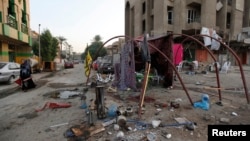Iraq is on high security alert amid a wave of bombs targeting Shi'ite pilgrims heading to the holy city of Karbala for the annual Ashura commemoration.
Sunni Islamic State militants claimed responsibility Monday for two attacks a day earlier in Baghdad that killed 23 people. The insurgents said that despite the government's tight security they carried out the attacks against what they described as the Shi'ites' "biggest infidel event."
Iraqi authorities say three more bomb explosions killed another 10 people Monday, including two soldiers.
One Iraqi police official said Baghdad's forces are on "a state of high alert" and guarding against attacks on the 100-kilometer trip from the capital to Karbala. Ashura, peaking on Tuesday, commemorates the 7th century death of one of Shi'ite Islam's revered figures, Prophet Muhammad's grandson Hussein, and marks the rift between Shi'ite and Sunni Islam.
Despite almost daily bombings, thousands of Shi'ites are headed to Karbala. One pilgrim, Suad Abdul Samad Hamza, said she was not worried about the Islamic State insurgents who have taken over much of northern and western Iraq.
"We are not afraid of Daesh and we are all united, God willing. We are not afraid of bombings. The road is very safe, God willing, mourning processions are spreading all along the road and the banner of Abu Abdullah al-Hussein will remain high,'' said Hamza.
Meanwhile, the U.S. military said it has launched another 14 aerial attacks in the last day on Islamic State positions, five in Syria and nine in Iraq. The Syrian attacks centered on Kobani, where Kurdish fighters are battling the militants for control of the town along the Turkish border. The U.S. Central Command said the strikes in Iraq were near Baiji, Fallujah and Rutba.
In Washington, the chief of the U.S. European Command, Air Force General Philip Breedlove, said the Islamic State "remains a concern" for the U.S., in part because of the number of foreigners who are fighting with the Islamic State. He said the fear is about radicalized fighters who return home to carry out "lone wolf" attacks.





